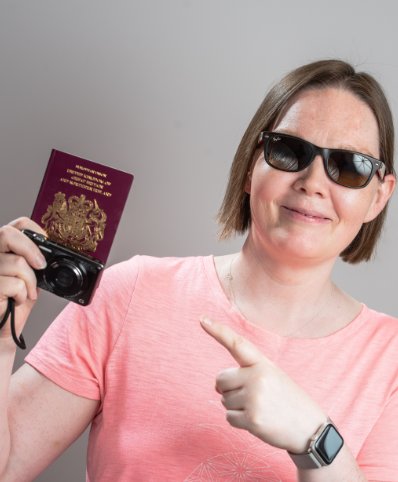9 Crown Row, Bracknell, Berkshire, RG12 0TH




Marketing & Operations Manager
Helen is Nick’s sister and she successfully set up and established our Lettings Department back in 2013. Having spent much of her career prior to DY working in marketing, Helen now heads up our Marketing & Operations department. This suits her organisational skills, creativity and keen eye for detail perfectly! She loves taking long walks with her Labrador Finn and when time permits, travelling and visiting new places around the globe.
Top of my bucket list is…
To keep travelling, visiting more new countries and ultimately, one day explore Europe in a (very comfortable!) camper van.
My guilty pleasure…
Ben & Jerry’s cookie dough ice cream. Probably best just not to buy it!
When I was younger, I wanted to be…
Less shy/more confident. Still working on it…
If I were a superhero, my superpower would be…
To help find a cure for cancer and dementia. Here’s hoping.
On Sunday morning, you can usually find me…
Up bright and early for a long dog walk in the country.
You might be surprised to know that…
One of my earliest qualifications as a teenager was as a Clarks trained shoe fitter. Ohh, all those back to school shoes!
14 Feb 2017
Buying your first home is a big step. In this article we set out a few simple steps that will help you avoid many of the pitfalls likely to be encountered by the unprepared first-time-buyer.
It may seem sensible to find a place first and then go through all the boring stuff like raising a mortgage. Don’t! Unless you’ve already found it, the best thing to do if you want to smooth the buying process and avoid disappointment later, is to establish your buying power. This means you must know how much of your cash you need to put aside for fees and expenses, how much is left for your deposit and how much money you will be able to borrow, affordably.
There are quite a few fees likely to be incurred when buying your new home. These may include;
1. Mortgage arrangement fees. This will be dependent on the lender and the mortgage amount but you should expect to pay £400 or more as a minimum. Usually, if you borrow more than 85% of the value of your home, you will need to pay a further charge to insure the lender against additional risk. This is likely to cost around 1.5% of the mortgage sum. You might be charged additional sums such as a mortgage account fee or mortgage set up fees too, so taking advice is very important if you are to get a good deal.
2. Homebuyer’s Valuation Report (HVR). Sometimes referred to as a valuation or survey, the HVR is undertaken by a Chartered Valuation or Building Surveyor approved by the lender you are borrowing from. Make sure you instruct a surveyor that is on your lender’s ‘panel’ of approved professionals.
Ideally your surveyor will be on all the major lender’s panels, so that if you need to change lender the valuation report is still valid. Again, this charge is dependent on the property’s value, but £400 or more is a reasonable minimum.
If the property is older or in need of work, the valuation surveyor may suggest a more thorough structural survey is undertaken at an additional charge. Sometimes the same surveyor can undertaken this at the same time, which should save you money. Of course, if the property is very modern, a simple valuation might suffice. A basic valuation is not a full structural survey and is only commissioned so that the lender can be sure that the property’s value is high enough to cover the loan and meet Loan to Value (LTV) ratios.
3. Stamp Duty Land Tax (SDLT). Stamp Duty is a tax paid to HMRC by the purchaser of property at the time of purchase. Again, the sum due will depend on the value of the property and the purchaser. If the purchaser is buying for buy-to-let investment purposes he is likely to have to pay more stamp duty. SDLT is payable on property over £125,000. It does not apply in Scotland. The rate of tax is tiered but starts at 2% on the home’s value over £125,000. With the average first-time-buyer’s home now costing around £260,000 in the South East of England, SDLT is likely to cost around £2,850.
Read our article What is Stamp Duty Land Tax and When do I pay it?
4. Conveyancing Charges. You will need to employ a solicitor or licensed conveyancer to deal with the paperwork for you. This is often based on the property value but can also be charged on an hourly basis. A fixed fee is usually better. A first time buyer might expect to pay between £500 and £1,200 plus around £300 in expenses and search fees.
5. Home Moving Charges. Most first-time-buyers do it themselves, roping-in friends and reluctant parents to help out! If you go down the professional route, shop around. Dependent on how much ‘stuff’ you need to move and where to, you should probably budget about £500 – £700. Make sure they give you a quote and that they are a reputable company and fully insured.
Read our Top Tips on Preparing to Move Home.
6. Incidental Charges. These might include cable and other utility connection charges, TV license, carpets, curtains, furniture, building and contents insurance, post re-direction from your rental place, etc. These costs will vary wildly depending on your needs, but it’s easy to see how a few thousand pounds could be spent.
Once you’ve worked out how much cash you need for expenses, you will know how much you have left for a deposit. If you can put down 15% or more you are likely to have a better choice of mortgages available to you, but as a minimum you are likely to need a deposit of 5% of the purchase price.
The various types of mortgage will vary dependent on your circumstances but the larger the deposit you have, the better the deals available to you. Before you apply for a mortgage you should get your finances straight. Make sure you can prove your income for the last 3 – 6 months. If self-employed, speak to your accountant and obtain an SA302 from HMRC. If you can afford to pay off credit card debt and loans before you apply, that’ll help the process, but sometimes keeping a larger deposit for your purchase will be a better idea.
It’s best not to move home or job immediately before you apply for a loan and make sure you are properly listed on the electoral role. Cut back on any frivolous monthly expenditure and try to save as much as you can every month in the six months before you apply. This will help you to illustrate how much you can afford to borrow and pay back.
Once you are ready, apply for a mortgage ‘in principle’. This will mean that when you have a mortgage offer, you can go shopping for your dream home knowing exactly what you can afford. It also means that you are ready to move swiftly when you agree a purchase and you’ll be much more appealing to the seller if you have a deposit and mortgage offer ready to go! Contact us for independent mortgage advice.
Don’t buy the first place you see. Take time to explore what’s available and get an idea of what different types of property are selling for and how long they are taking to sell. Build a relationship with the estate agents that deal with your type of property and keep in constant contact with them.
A property will sell for what it’s worth if it’s properly marketed by a professional agent. If property has been on the market a while, you might consider offering less than the asking price. If you are able to ‘perform’ quickly and buy the property with your mortgage offer already agreed. Also read How do I make an Offer on a House?
New homes have several advantages. For a start, they are new, so maintenance costs will be lower. Housebuilders are likely to be offering deals on carpets and curtains, etc so you might be able to roll some of those costs into your mortgage, allowing you to put down a larger deposit and therefore reduce your mortgage costs.
Finally, newly built homes should be protected by a 10 year NHBC Warranty if the builder is registered. This should enable the valuer to be more confident when placing a valuation on the property for mortgage purposes.
Buying your first home can be confusing. If you’re unsure, don’t be afraid to ask. Friends and family that have been through the process can be helpful but there is no substitute for professional advice. Call us on 01344 860121 for a chat.
Get in touch